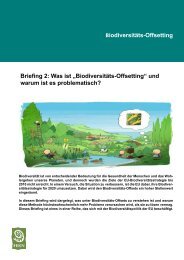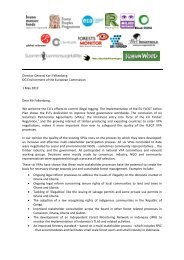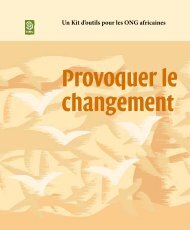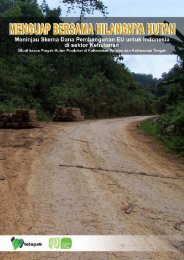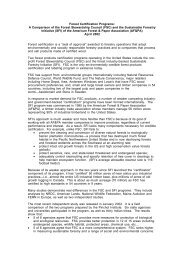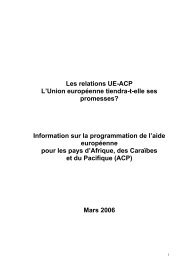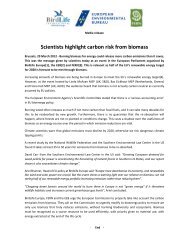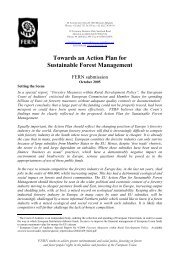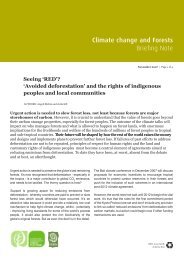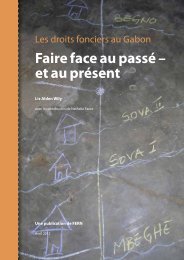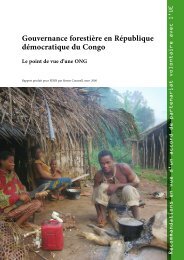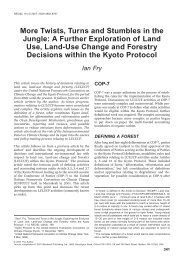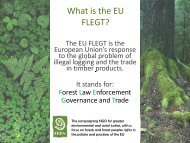Papua New Guinea - Fern
Papua New Guinea - Fern
Papua New Guinea - Fern
You also want an ePaper? Increase the reach of your titles
YUMPU automatically turns print PDFs into web optimized ePapers that Google loves.
During the course of the moratorium, the government allowed several new projects to<br />
commence, violating the loan conditionality and providing justification for the Bank to withhold<br />
funding. Landowners in the Kiunga-Aiambak area of Western Province, <strong>Papua</strong> <strong>New</strong> <strong>Guinea</strong>,<br />
have lodged a claim with the World Bank Inspection Panel regarding the Bank's failure to adhere<br />
to policy and commitments regarding rainforest conservation. Landowners claim that they have<br />
suffered economic, social, environmental and cultural loss as a result of the illegal logging on<br />
their land during the period of the moratorium. This project falls in PNG’s largest and most<br />
important rainforest wilderness. Despite having been brought to the attention of the government<br />
and the World Bank, nothing has been done to stop illegal logging operations.<br />
The government of PNG, World Bank and Australia are guilty of frittering away the opportunity<br />
offered by the moratorium. When loan conditions were violated and new illegal logging<br />
operations started during the moratorium, the Bank refused to take putative actions allowed<br />
under the loan agreement. Indeed, despite strong public pressure, the World Bank refused to<br />
hold the PNG government to its loan commitments. The moratorium on logging was allowed to<br />
lapse, final loan payments were authorized and business as usual overly intensive and highly<br />
environmentally damaging industrial forestry recommenced. The World Bank has not followed<br />
its policies nor held the government of PNG accountable for meeting its forest conservation<br />
commitments under the loan. This moratorium was a failure from which little good has come.<br />
Failed forest sector reform in PNG is occurring within the context of the World Bank loosening<br />
its restrictions on investments in rainforest logging. Turning the Bank loose to, in their own<br />
words, "integrate forests into sustainable economic development", will guarantee the demise of<br />
PNG’s remaining large, contiguous and natural old-growth primary forests. It is becoming<br />
abundantly apparent that the intent of the Bank's efforts to reform its forest policy is to be<br />
allowed to finance commercialization of PNG’s and the World's remaining forest wildlands.<br />
The World Bank is yet to present any scientific, peer-reviewed evidence that large-scale<br />
commercial logging can be practiced in an ecologically sustainable or socially responsible<br />
manner in the tropics or elsewhere. The Bank routinely uses "sustainable forest management" to<br />
refer to the extensive and intensive, ecologically diminishing and predatory industrial forest<br />
management occurring in PNG and most other tropical rainforests. What is being sustained is<br />
foreign exchange revenues and timber yields (at least for awhile longer than completely<br />
unregulated logging). The Bank has spearheaded failed tropical timber industry reform efforts<br />
worldwide for over a decade.<br />
The Bank's effort to bring <strong>Papua</strong> <strong>New</strong> <strong>Guinea</strong>’s rainforests into the global economic system<br />
cannot be reconciled with ecological requirements for national rainforest and biodiversity<br />
sustainability. Efforts to "integrate forests into sustainable economic development" appear to<br />
primarily be driven by principles of trade liberalization and export growth for poverty alleviation<br />
(for some anyway), rather than any deep-rooted concern for forest conservation and global<br />
ecological sustainability. The World Bank’s entire PNG rainforest policy is based on the false<br />
premise that commercial logging in primary forests is ecologically sustainable and represents a<br />
biodiversity conservation strategy. This is patently false.<br />
13



